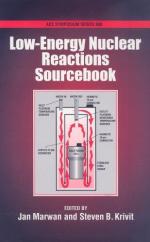|
This section contains 980 words (approx. 4 pages at 300 words per page) |

|
Nuclear decay, neutron capture, fission, and fusion are the four major nuclear reactions.
The understanding, use, and control of nuclear reactions is one of the most profound scientific accomplishments. Although chemical reactions of everyday experience generally take place between the electrons surrounding an atom there are important and fundamental processes that take place in the nucleus of an atom. Nuclear reactions are different than chemical reactions. Nuclear energies are several orders of magnitude larger than the energies involved in chemical reactions.
In 1903, French physicist, Antoine Henri Becquerel won the Nobel Prize in physics for his work with spontaneous radioactivity. In 1898, French scientists, Marie and Pierre Curie, two-time Nobel Laureates, discovered the naturally occurring radioactive elements polonium and radium.
In the 1930s, French physicists Frédéric and Irène Joliot-Curie demonstrated artificial radioactivity by bombarding stable atoms with nuclear particles to create radioactive...
|
This section contains 980 words (approx. 4 pages at 300 words per page) |

|


